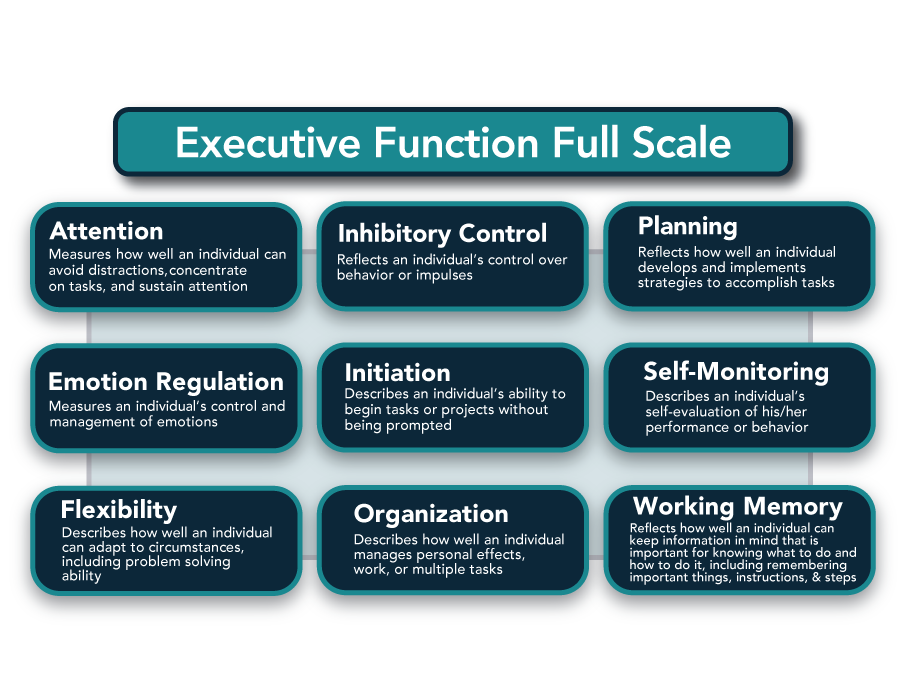The Long-term Effects of COVID-19 on Cognition
According to Harvard Health Publishing, “brain fog,” a term used to describe slow and sluggish thinking, has been cited as a lasting symptom post-COVID-19 infection. The highly contagious virus has been reported to affect various aspects of an individual’s cognition, including executive function. Sam Goldstein and Dr. Jack A. Naglieri’s Handbook of Executive Functioning (2014) defines executive function as “…an umbrella term used for a diversity of hypothesized cognitive processes, including planning, working memory, attention, inhibition, self-monitoring, self-regulation, and initiation carried out by prefrontal areas of the frontal lobes” (p. 3). Among 25 studies reviewed in a recent paper, delayed recall and learning were the most impaired memory domains1. Among executive functions, abstraction, inhibition, set shifting, and sustained and selective attention were most commonly impaired1.
Individuals experiencing the long-term effects of COVID-19, also known as “long COVID,” may encounter issues with attention, memory, and complex skills such as planning, maintaining focus, remembering instructions, and multi-tasking2. Several reviews on long COVID define the condition as based on symptoms lasting longer than three months following acute infection1. Recent research has also reported cognitive impairment among those hospitalized, non-hospitalized, and individuals with more severe cases2.
What is the correlation between COVID-19 and potential cognitive impairment?
In a study of individuals who recovered from COVID-19, Zhou and colleagues found a pattern of impaired attention to important information as a possible result of underlying inflammation3. The study found a link between continuous “attention function” changes and levels of C-reactive protein (CRP), an inflammatory marker4. It is important to note that the study by Zhou and colleagues was based on the immediate effects of post-COVID-19 infection on cognitive function, since tests were administered approximately two to three weeks after participants recovered from the virus. Thus, further research is required to assess how COVID-19 and inflammatory processes impact cognitive function long-term.
Another study found that impairment in executive functioning, processing speed, and memory was predominantly found in those who were hospitalized during their COVID-19 infection, and these impairments were observed several months after recovery5. The participants in the study by Becker and colleagues completed neuropsychological measures to examine their cognitive functioning. Participants were adults treated in outpatient, emergency department, or inpatient hospital settings with no history of dementia. Results revealed that cognitive impairments were predominantly found in the inpatient sample, followed by patients treated in the emergency department, while outpatients had fewer impairments than both hospital samples. Specifically, the study’s results showed that impaired attention, executive functioning, category fluency, memory encoding, and memory recall were more common among individuals who were hospitalized than those in the outpatient group5. Additionally, the study identified impairments related to memory encoding and category fluency were more likely for individuals treated in emergency departments than those in the outpatient group5. Though certain populations are commonly more susceptible to cognitive impairment after critical illness, such as adults 65+ years, Becker and colleagues found that a substantial proportion of the study’s younger participants (ages 38-59 years) displayed cognitive dysfunction several months after recovering from the virus5.
Fatigue has been reported in almost one-third of individuals infected with COVID-19, persisting at least six months after infection6. A study by Calabria and colleagues examined a sample of adults who expressed cognitive complaints after COVID-19 infection, and they found that executive dysfunction consistently increased after infection, with significant neuropsychological deficits reported in long-term memory, executive functioning, and attention6. The researchers also reported that fatigue was predicted by executive function impairments, as the severity of the impairment was directly associated with higher fatigue scores6.
How does post-COVID-19 cognitive impairment affect younger populations?
Manukyan and colleagues examined psycho-emotional disorders and cognitive deficits in university students (ages 17-27 years) who had recovered from a mild case of COVID-197. The researchers examined the presence and frequency of fatigue, depression, anxiety, and three core cognitive functions (working memory, inhibition, and task-switching) post-COVID-19 infection. Findings revealed that the students who had previously been infected with COVID-19 had significantly higher depression scores and worse inhibition performance than age-matched controls with no history of COVID-19 infection7. In particular, deficits in inhibition may result from a slower recovery in regions of the brain involved in inhibitory processes7. Even though the students only had mild cases of the virus, these results suggest that slight cognitive impairment remains after recovery. It is clear that research supports the presence of deficits in cognitive functioning across a wide age range, and these deficits persist well after the infection has been resolved.
Early identification of cognitive deficits
Although research about the long-term effects of COVID-19 on cognition is still in its early stages, we can begin identifying ways to detect cognitive deficits. One way this goal can be achieved is by measuring one’s executive function. A cognitive assessment can help address concerns at various stages of life, whether it be natural signs of degeneration or cognitive impairment caused by illness. MHS offers the Comprehensive Executive Function Inventory™ (CEFI®) and the Comprehensive Executive Function Inventory™ Adult (CEFI® Adult), two instruments designed to measure and evaluate executive function strengths and weaknesses in youth and adults. Both CEFI and CEFI Adult use a comprehensive, standardized behavior rating scale to help formulate a diagnosis and treatment plan (see Figure 1).
In addition, both CEFI and CEFI Adult allow for multi-rater perspectives on an individual’s executive function strengths and weaknesses. The CEFI can be completed by a parent or teacher rating youth aged 5 to 18 years and allows for the option of self-reporting (for youth aged 12 to 18 years). The CEFI Adult contains Self-Report and Observer (e.g., a spouse or a friend) forms, for ratings of individuals aged 18 years and older. To arrive at an accurate diagnosis, it is beneficial to receive perspectives from multiple raters in addition to other neuropsychological evaluations. Another beneficial feature offered by both CEFI and CEFI Adult is the ability to generate a Progress Monitoring and Treatment Effectiveness Report to track changes in scores and monitor improvements over time. Considering the prevalence of impaired cognitive function post-COVID-19 and research that emphasizes its impact on memory and attention, measuring executive function can be an important first step for early identification.
Figure 1: Diagram of nine CEFI scales with key areas measured

For more information on measuring executive function in youth and adults, learn more about the CEFI and CEFI Adult.
References
1 Bertuccelli, M., Ciringione, L., Rubega, M., Bisiacchi, P., Masiero, S., & Del Felice, A. (2022). Cognitive impairment in people with previous COVID-19 infection: A scoping review. Cortex, 154, 212-230.
2 Fong, T. (2022, March 17). Brain fog: Memory and attention after COVID-19. Harvard Health Publishing. Retrieved April 4, 2023.
3 Budson, A. E. (2021, March 4). The hidden long-term cognitive effects of covid-19. Harvard Health Publishing. Retrieved April 4, 2023.
4 Zhou, H., Lu, S., Chen, J., Wei, N., Wang, D., Lyu, H., Shi, C., & Hu, S. (2020). The landscape of cognitive function in recovered COVID-19 patients. Journal of Psychiatric Research, 129, 98-102.
5 Becker, J. H., Lin, J. J., Doernberg, M., Stone, K., Navis, A., Festa, J. R., & Wisnivesky, J. P. (2021). Assessment of cognitive function in patients after COVID-19 infection. JAMA Network Open.
4(10). doi:10.1001/jamanetworkopen.2021.30645
6 Calabria, M., García-Sánchez, C., Grunden, N., Pons, C., Arroyo, J. A., Gómez-Anson, B., del Carmen Estévez García, M., Belvis, R., Morollón, N., Vera Igual, J., Mur, I., Pomar, V., & Domingo, P. (2022). Post-COVID-19 fatigue: The contribution of cognitive and neuropsychiatric symptoms. Journal of Neurology, 269, 3990-3999.
7 Manukyan, P., Deviaterikova, A., Velichkovsky, B. B., & Kasatkin, V. (2022). The impact of mild COVID-19 on executive functioning and mental health outcomes in young adults. Healthcare, 10(10).
8 Goldstein, S., & Naglieri, J. A. (Eds.). (2014). Handbook of Executive Functioning. Springer Science+Business Media. doi:10.1007/978-1-4614-8106-5_2










